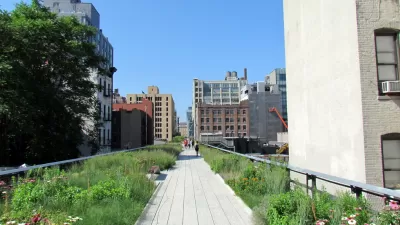Urbanism
Lessons Learned: Five Principles of People and Place
Employing material gathered for his forthcoming book, Chuck Wolfe argues for layered, historical illustrations of how people relate to built and sociocultural communities around them, and offers 5 principles and companion lessons for placemaking.
Traditional Cities and Towns: Incubators of Incompetent Children
With tongue firmly in cheek, Scott Doyon asks urban dwellers, "Are your enviable surroundings crippling the children?"

Landscape Architects Step Into Vacuum Left by Planners and Architects
Landscape Architecture is a field in the ascendency, writes Alan G. Brake. Its rise can be traced to the inability of Architects and Planners to engage with some of the most important challenges of our time.

Is Your City an Innovator or a Follower?
Howard Blackson walks through the planning layers of San Diego for a history lesson as well as a look to the Next Urbanism.
Testing Density with Trick or Treaters
Planner and urbanist Brent Toderian explains why Halloween is his favorite holiday.
Urban Planning Trends are Bad Medicine
In a provocative essay, Mitchell Sutika Sipus examines the dangers of subscribing to conventions such as style or planning trends, and argues why planners must forgo ideologies to create better solutions for community problems.
Escaping the Pitfalls of Professional Discourse
Kaid Benfield returns to his popular blog at the NRDC's Switchboard site after a three-week hiatus, with thoughts on the purpose of his writings and how "overly familiar vocabulary can lead to overly familiar thinking."
What Makes Koolhaas Tick?
Former Times architecture critic Nicolai Ouroussoff pens a profile of the Dutch architect Rem Koolhaas, whose "most provocative—and in many ways least understood—contribution to the cultural landscape is as an urban thinker."
NPR Can Help You Determine if You Live in a City
A tongue-in-cheek, and somewhat convoluted, infographic produced in association with NPR's "Cities Project" aims to help participants deduce whether or not they live in a city.
Making Regulatory Reform Work in Seattle
Although Seattle's downtown redevelopment may be receiving plaudits, Chuck Wolfe describes efforts underway to rethink land use regulations on a broader level in the city, with jobs in mind.
Urbanism is for Everyone
Is it mid-March already? I’m far overdue for announcing my departure from Planetizen, which happened at the tail end of 2011. It was a wonderful 3 ½ years at the helm, and I thank Chris Steins and Abhijeet Chavan for giving me the opportunity back in 2008 to steer this incomparable resource.
The Kimmelmania Backlash
Matt Chaban explores the divided opinions on the work of the fairly new architecture critic for The New York Times, Michael Kimmelman, who some complain isn't writing enough about Architecture.
Urban Revitalization: Baby Steps or the Magic Bullet?
Writer Tara Sturm explores the merits of incremental urbanism on revitalization efforts with the help of L.A. architect Alan Pullman, highlighting grassroots, community-driven economic development.
Six Trending Urbanist Themes for the New Year
Chuck Wolfe analyzes his 2011 articles which appeared on Planetizen and in other sources, and derives his urbanist trends to watch for in 2012.
Rules for Planning Successful Retail Developments
Hazel Borys discusses how several key form-based guidelines for retail can encourage success in the most risky of all development types.
On the Risks and Responsbilities of Living (in Cities)
Last summer, most of the nation was justifiably outraged when Raquel Nelson was convicted of vehicular homicide because her four-year old son stepped off a median into oncoming traffic and was killed. Common sense alone should have kept this case from going to trial, but I believe this case should have raised a bigger and more encompassing issue for planners and a question of social ethics: What is the responsibility we take as individuals for the choices we make living in an urban environment?
Here Comes the Walmart Express
The megaretailer is part of a trend to rethink and shrink stores, as big boxes around the country have seen their sales plummet.
The Urbanism of Protest
Recent protests throughout Spain and Europe over unemployment and governmental representation offer a unique look at how protests use and create public space and urbanity.
"No Net Loss" for Third Places?
Amid the dissolution of Borders bookstores in urban centers, Chuck Wolfe urges policymakers and the private market to assure "no let loss" in the spirit of natural resource protection to assure third places remain available in American cities.
European Transportation Policy: Make Life Difficult For Motorists
It's the opposite of conventional transportation policy in American cities that places motorist convenience in high priority (think 'level of service'). This story shows what European cities are doing to get motorists out of cars.
Pagination
Urban Design for Planners 1: Software Tools
This six-course series explores essential urban design concepts using open source software and equips planners with the tools they need to participate fully in the urban design process.
Planning for Universal Design
Learn the tools for implementing Universal Design in planning regulations.
Caltrans
Smith Gee Studio
Institute for Housing and Urban Development Studies (IHS)
City of Grandview
Harvard GSD Executive Education
Toledo-Lucas County Plan Commissions
Salt Lake City
NYU Wagner Graduate School of Public Service


































